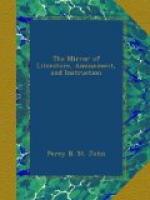I now, in this hasty, feeble, and divaricated biographical sketch, approach the great and favourite work of my admired friend, The History of British Birds. The first volume of this all-delighting work was published in 1797, jointly by Bielby and Bewick, but was afterwards continued by Bewick. This beautiful, accurate, animated, and (I may really add) wonderful production, having passed through six editions, each of very numerous impressions, is now universally known and admired.
The first time I had personal interview with my venerable friend was at Newcastle upon Tyne, on Wednesday, October 1, 1823, after perambulating the romantic regions of Cumberland and Westmoreland, with my friend, John E. Bowman, Esq., F.L.S. We had been told that he retired from his workbench on evenings to the “Blue Bell on the side,” for the purpose of reading the news. To this place we repaired, and readily found ourselves in the presence of the great man. For my part, so warm was my enthusiasm, that I could have rushed into his arms, as into those of a parent or benefactor. He was sitting by the fire in a large elbow-chair, smoking. He received us most kindly, and in a very few minutes we felt as old friends. He appeared a large, athletic man, then in his seventy-first year, with thick, bushy, black hair, retaining his sight so completely as to read aloud rapidly the smallest type of a newspaper. He was dressed in very plain, brown clothes, but of good quality, with large flaps to his waistcoat, grey woollen stockings, and large buckles. In his under-lip he had a prodigious large quid of tobacco, and he leaned on a very thick oaken cudgel, which, I afterwards learned, he cut in the woods of Hawthornden. His broad, bright, and benevolent countenance at one glance, bespoke powerful intellect and unbounded good-will, with a very visible sparkle of merry wit. The discourse at first turned on politics (for the paper was in his hand,) on which he at once openly avowed himself a warm whig, but clearly without the slightest wish to provoke opposition. I at length succeeded in turning the conversation into the fields of natural history, but not till after he had scattered forth a profusion of the most humorous anecdotes, that would




